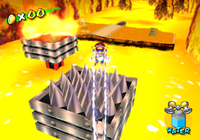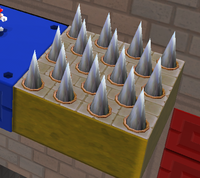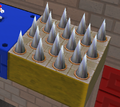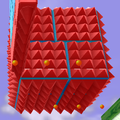Spike Trap

|
This article has been chosen to be a focus for this month's edition of The 'Shroom Spotlight. Be sure to read about our goals for the article, and help to contribute in any way that you can. |
It has been requested that this article be rewritten and expanded to include more information. Reason: May 19, 2018
- This article is about the common obstacle. For other uses of the word "spike", see Spike (disambiguation).

Spike Traps (or Spikes, sometimes Spiked Platform[1] or Spiked Floor[2]) are harmful obstacles that appear in nearly all Mario games. Spike Traps can be stationary, retractable, or attached to a moving object. They are first introduced in Super Mario Bros. 2. They function similar to the Icicles from Mario Bros., however, Spike Traps fall differently.
History
Super Mario series
Spike Traps are very common obstacles throughout the Super Mario series. When touched, they cause the player to lose their current power-up and if the player is Small Mario, they will lose a life. Players can safely traverse across spikes when invincible without any consequences.
In Super Mario Bros. 2, in a few levels, the player has to ride an Autobomb in order to cross some Spike Traps.
In Super Mario Bros. 3, if Mario or Luigi wear Goomba's Shoe, they can easily hop across spikes but can still be hurt from touching them with their sides or head.
In Super Mario World, Yoshi can safely walk on spike traps due to the boots they wear. This game also introduces the Falling Spike.
In Super Mario Sunshine, only appearing in Corona Mountain, coming into contact with it will usually cause Mario to lose a life.
In Super Mario Galaxy and Super Mario Galaxy 2, Mario and Luigi run uncontrollably after coming into contact with a spike trap.
In Super Mario 3D Land, Spike Bars make their first appearance. They operate similarly to Fire Bars. Retractable spikes on the floor make their appearance as well.
In Super Mario Odyssey, the Spike Traps reappear, where they can be found in Bowser's Kingdom.
Yoshi series
Yoshi's Story features living, jumping Spikes in Bone Dragon Pit and Magma Castle.
In other games, spikes are fatal, as simply touching them causes a Yoshi to lose a life. A more common sharp object, a thorn, also appears in the Yoshi's Island series.
Super Mario Maker
In Super Mario Maker and its 3DS port, Spike Traps are classified as block objects. Depending on the game style and theme, Spike Traps can change appearance, most notably in the Super Mario Bros. 3 and Super Mario World game styles, where in the underwater themes of both, the Spike Trap can change into a Jelectro and an Urchin, in that order. Additionally, shaking a Spike Trap in the New Super Mario Bros. U ground theme makes a train sound.[3]
Paper Mario: Color Splash
Spike Traps appear in Paper Mario: Color Splash. Spike pits appear in levels such as Mustard Café, The Golden Coliseum, and Fortune Island. 8-bit spikes appear in Green Energy Plant. In Kiwano Temple, there are many spikes that resemble Spiny Shells. Some must be crossed by rolling platforms, and others must be flipped over with a POW Block.
Super Mario Run
Spike Traps reappear in Super Mario Run, making their first appearance in the level Shell Me the Way! when collecting the Black Coins. They have the same appearance as the Spike Traps in the New Super Mario Bros. U style of Super Mario Maker.
Gallery
- Yellow spikes YI.PNG
Spikes in Flip-Out Galaxy in Super Mario Galaxy 2.
Multi-surface spikes that appear only in the Flipsville Galaxy.
The spikes' appearance in the Super Mario Bros. style in Super Mario Maker.
Names in other languages
| Language | Name | Meaning | Notes |
|---|---|---|---|
| Portuguese | Armadilha Espinhosa[?] | Spiked Trap | |
| Spanish | Trampa Espinosa[?] | Spiky Trap |
References
- ^ Hodgson, David S J, Bryan Stratton, and Stephen Stratton. Super Mario Sunshine Prima Official Strategy Guide. Page 15.
- ^ von Esmarch, Nick, and Cory van Grier. Donkey Kong Country: Tropical Freeze Prima Official Game Guide. Page 26.
- ^ GameXplain. April 4, 2016. Train Whistle SECRET in Super Mario Maker. YouTube. Retrieved May 18, 2016.
- ^ Shogakukan. 2015. Super Mario Bros. Hyakka: Nintendo Kōshiki Guidebook, pages 41, 61, 78, 105, 119, 150, 200.
- ^ Mario & Wario instruction booklet, page 9.
- ^ Shogakukan. 2015. Super Mario Bros. Hyakka: Nintendo Kōshiki Guidebook, pages 170, 186, 233.
- Traps and Obstacles
- Mario & Wario
- Mario vs. Donkey Kong Objects
- Mini Mario & Friends: amiibo Challenge Objects
- New Super Mario Bros. Objects
- New Super Mario Bros. 2 Objects
- New Super Mario Bros. U Objects
- New Super Mario Bros. Wii Objects
- Paper Mario: Sticker Star Objects
- Paper Mario: Color Splash Objects
- Super Mario Advance Objects
- Super Mario Advance 4: Super Mario Bros. 3 Objects
- Super Mario Bros. 2 Objects
- Super Mario Bros. 3 Objects
- Super Mario Galaxy 2 Objects
- Super Mario Maker Objects
- Super Mario Sunshine Objects
- Super Mario Odyssey Objects
- Super Mario World Objects
- Super Mario World 2: Yoshi's Island Objects
- Super Paper Mario Objects
- Wario Land: Super Mario Land 3 Objects
- Wario Land II Objects
- Yoshi Topsy-Turvy Objects
- Yoshi's Island DS Objects
- Yoshi's Island: Super Mario Advance 3
- Yoshi's New Island Objects
- Yoshi's Story Objects
- Yoshi's Woolly World Objects








